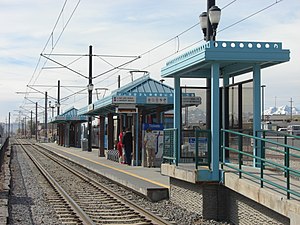Murray Central station is a light rail and commuter rail station in Murray, Utah, United States that is served by the Blue and Red lines of Utah Transit Authority's (UTA) TRAX light rail system that operates in Salt Lake County and FrontRunner, which operates along the Wasatch Front with service from Ogden in central Weber County through Davis County, Salt Lake City, and Salt Lake County to Provo in central Utah County. It is part of the FrontRunner South extension. The Blue Line provides service from Downtown Salt Lake City south to Draper, while the Red Line provides service from the University of Utah to the Daybreak community of South Jordan.
 Murray Central station TRAX platform, March 2015 | |||||||||||||||||||||
| General information | |||||||||||||||||||||
| Location | TRAX: 5144 Cottonwood Street[1] FrontRunner: 40 West Vine Street[2] Murray, Utah United States | ||||||||||||||||||||
| Coordinates | 40°39′36″N 111°53′45″W / 40.659870°N 111.895929°W | ||||||||||||||||||||
| Owned by | Utah Transit Authority (UTA) | ||||||||||||||||||||
| Platforms | 1 island platform (TRAX) 1 island platform (FrontRunner) | ||||||||||||||||||||
| Tracks | 2 (TRAX) 2 (FrontRunner) | ||||||||||||||||||||
| Connections | |||||||||||||||||||||
| Construction | |||||||||||||||||||||
| Structure type | At-grade | ||||||||||||||||||||
| Parking | 1,095 spaces (combined with FrontRunner station)[4][5] | ||||||||||||||||||||
| Bicycle facilities | 4 lockers[6] | ||||||||||||||||||||
| Accessible | Yes | ||||||||||||||||||||
| History | |||||||||||||||||||||
| Opened | December 4, 1999[7] | ||||||||||||||||||||
| Services | |||||||||||||||||||||
| |||||||||||||||||||||
| |||||||||||||||||||||
| |||||||||||||||||||||
Description
editThe station is located at 5144 Cottonwood Street and is accessed from either East Vine Street on the north or West 5300 South (SR-173/Spartan Street) at 100 West.[1][8] To the east of the station is the Intermountain Medical Center complex, with its large parking lot. Between the two stations' free park and ride lots, there are nearly 1,100 parking spaces available.[4][5] The adjacent Intermoutain Medical Center was built on the site of the former Murray Smelter. The Murray Downtown Historic District is across Little Cottonwood Creek to the northeast. The station is located within the FrontRunner's quiet zone, so FrontRunner trains do not routinely sound their horns when approaching public crossings within this corridor.[9][10] The TRAX station opened on December 4, 1999,[7] while the FrontRunner station opened, along with the rest of the FrontRunner South, on December 10, 2012.[8]
References
edit- ^ a b UTA Rail System Map (Map). Utah Transit Authority. Archived from the original on August 21, 2008. Retrieved May 31, 2008.
- ^ TRAX & FrontRunner Map (PDF) (Map). Utah Transit Authority. Archived from the original (PDF) on December 3, 2012. Retrieved December 12, 2012.
- ^ "Salt Lake County System Map" (Map). Utah Transit Authority. August 7, 2022.
- ^ a b "TRAX Parking and Stops". Utah Transit Authority. Archived from the original on December 23, 2012. Retrieved March 4, 2013.
- ^ a b "FrontRunner Stations". Utah Transit Authority. Retrieved March 4, 2013.
- ^ "UTA Rideshare — Programs > Bicycle". Utah Transit Authority. Archived from the original on February 2, 2008. Retrieved June 8, 2008.
- ^ a b Van Eyck, Zack (August 26, 1999). "All aboard! TRAX trains will roll in December". Deseret News. Salt Lake City: Deseret Digital Media. Archived from the original on December 17, 2014. Retrieved March 7, 2013.
- ^ a b Park, Shara (December 10, 2012). "FrontRunner South opens, brings changes to north line". KSL-TV. Salt Lake City: Deseret Digital Media. Retrieved December 12, 2012.
- ^ Hesterman, Billy (November 29, 2012). "No more horns: Quiet zone now in effect for trains". Daily Herald. Provo, Utah: Lee Enterprises. Retrieved May 4, 2013.
- ^ "Front Runner South FAQs". Utah Transit Authority. Retrieved May 4, 2013.
External links
editMedia related to Murray Central station at Wikimedia Commons
